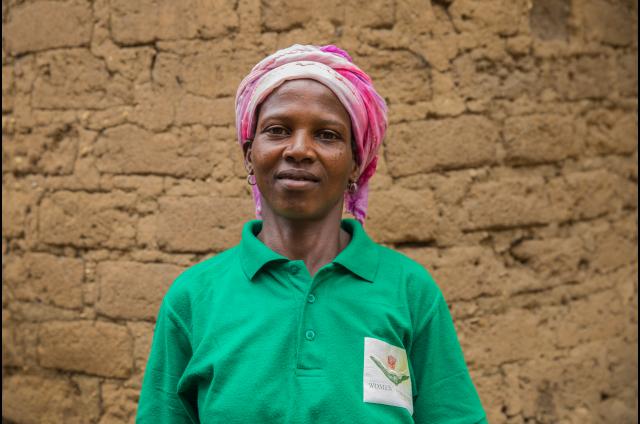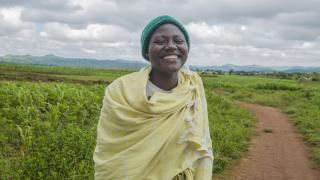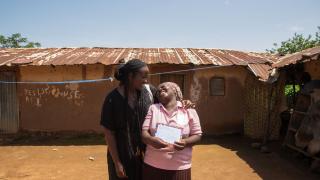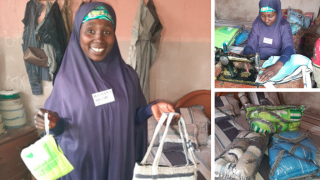The Kidnapping Crisis in Nigeria
Throughout Nigeria, the number of people being kidnapped has risen dramatically in recent months.
Men, women and children are forcefully taken from schools, homes and community gatherings by criminal gangs. Our priority is the safety and well-being of our staff and the women and girls who are disproportionately targeted. Despite these challenges, we continue to work towards a future where women can unleash their power free from the threat of violence and intimidation.
Since kidnappings in Nigeria gained international attention in 2014 with the worldwide #BringBackOurGirls campaign, students, teachers and others continue to be kidnapped and held to ransom by “bandits”. However, in recent months, the spate of kidnappings has worsened.
Bukola Onyishi, the Country Director for Women for Women International in Nigeria says the security situation is worse than she has ever known. She explains that kidnappings used to be confined to certain areas of the country with only a few people were targeted. Now that has changed.
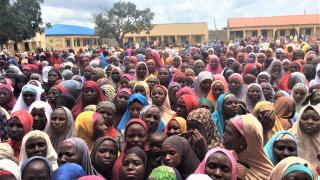
Buki says, "I think nobody is actually safe. From what I’ve seen nobody is actually left out – from children to young adults to adults to elderly. Nobody is left out."
Gangs carrying out the kidnappings terrorise cities such as Jos and Kaduna. Since December 2020, around 1,000 people have been taken in Kaduna alone - a large number being women and girls. At the beginning of July 2021, around 140 students were kidnapped while sleeping in the dorms of their boarding school. As of July 25, 81 students remain missing.
As a result of kidnappings across Nigeria, students of all age ranges are being forced to withdraw from school and kidnapped women and girls often fall victim to forced marriage or slavery.
What is leading to these rising kidnappings?
Economic instability, a lack of effective policing and the effects of the pandemic have all contributed to the wave of abductions. Women for Women International staff in Nigeria tell us that a high unemployment rate among young men and high levels of drug addiction have also made the situation worse. In the Kaduna school kidnapping in July, kidnappers held victims for ransom insisting on cash rewards and they face instant death if families cannot pay the required ransom.
Kidnappers, referred to as “bandits” in the North-east of Nigeria, are frequently armed, escorting people into custody with threats of violence. A lack of a cohesive security system allows them to take their victims with little to no retaliation from the state.
Buki says that in some places the infrastructure is part of the problem. The roads are unsafe, the state of the roads is helping the kidnappers, she says.
When things are quiet, it feels like a ticking time bomb.
How is this affecting Women for Women International’s programmes?
Women in Nigeria have been at the forefront of demanding better national security for decades. Our Nigeria programme has taken increased precautions and staff remain agile and ready to adapt to changing circumstances. They constantly monitor travel to areas which are kidnapping “hotspots” but as soon as it’s safe they continue to deliver our programmes.
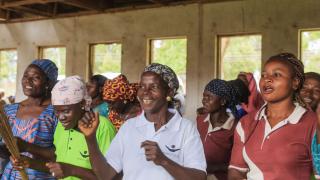
This is because we believe that powerful women, like those in our Nigerian staff and country programmes, must be part of both the dialogue and action when it comes to finding a solution to the problem of abductions.
Our foundational trainings are geared toward helping women know and defend their rights in order to influence decisions in their own communities. We rely heavily on first hand feedback from program participants to tailor safety measures and guidelines to fit their needs. Reliance on technology spurred by COVID-19 has inspired us to test using virtual learning methods additionally as needed.
While we continue to monitor this security situation, we remain as dedicated as ever to supporting women in Nigeria and around the world to find power for themselves, their families and their communities.
Read more
Our Work in Nigeria
subtitle:
Since 2000, Women for Women International - Nigeria has reached more than 79,500 women through our work in Enugu and Plateau states.
Messages of hope from Nigeria
subtitle:
The power of sisterhood in action offers an important reminder: tough times don't last.
Hassana's Story
subtitle:
When Boko Haram attacked their village in northern Nigeria, Hassana and her family were forced to flee. With support of UK aid from the UK government, she enrolled on our programme last November.

